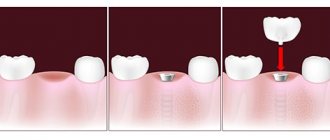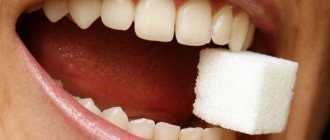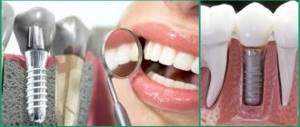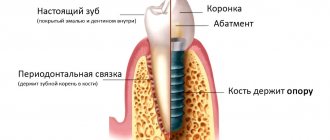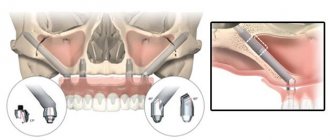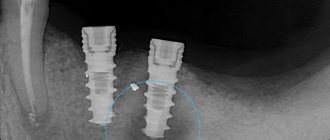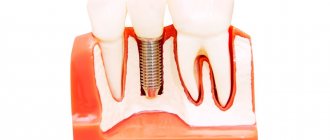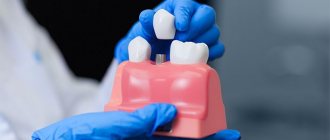How do you imagine dental implantation? The implant surgeon first makes a small, neat hole in the gum and inserts a screw-like implant into it. Then you wait to see how the body reacts to this “root” of the future tooth. And the doctor fixes the crown. Now you are the happy owner of a full tooth. It stands securely in the dentition and bears loads. This happens with modern implantation methods. But many Russian dental clinics still use basal implantation. Why this technique is not offered at the Center for Modern Dentistry - we will tell you in this article.
Basal dental implantation: what is it?
Classic dental implantation involves the installation of dental implants in the upper layers of bone tissue. This layer is also called spongy, as it has a porous structure. The main disadvantage of the spongy layer of the jaw is that it is susceptible to atrophy (resorption). In practice, the dentist often encounters a situation where the volume of this tissue is not enough to securely fix the artificial root, so it is necessary to perform additional manipulations that require the patient to spend time and money.
Basal implantation solves this problem by immersing the implant into the deeper basal layers of the bone. They are non-porous in structure and very dense and hard, so they do not decrease in volume over time. All manipulations are performed in one stage, but provided that the patient does not have problems that need to be eliminated before the operation.
About the manufacturer
For a long time, due to imperfections in the design of artificial roots, basal implantation was very traumatic, and many companies producing orthopedic products switched to producing popular classic implants.
A brand of the Swiss company Ihde Dental AG, Oneway Biomed implants are the first systems that were developed specifically for single-stage implantation with immediate loading.
The corporation is headed by professor and practicing implantologist Stefan Alfred Ide, who for many years has been creating a fundamentally new design that could solve the problems of prosthetics for people with complex clinical situations. Such patients were denied implants according to the classical protocol, and had to settle for uncomfortable and unattractive removable dentures.
Implants of this brand provide an opportunity for a comprehensive solution to problems caused by complete loss of teeth, even with a lack of bone tissue, during inflammatory and destructive processes of the dentofacial apparatus.
The Biomed implant line includes products not only for basal implantation, but also for classical (two-stage) and for the simultaneous procedure of removing decayed teeth and replacing them with artificial roots.
Features of implants
Basal implants are structurally different from conventional ones. Since they need to be installed much deeper, their length must be sufficient (up to 55 mm, while the usual ones have a maximum of 15 mm).
The photo shows compression single-component implants (top row), basal single-component implants (second row from top) and zygomatic implant (bottom row).
Basal implants are divided into two types:
- Conventional basal implants. They have a working part in the form of a large diameter thread, a smooth neck and a visible part (abutment) on which the denture is installed. They are used for installation in the basal layer of bone, and are additionally fixed in the cortical layer, which increases reliability. They are used in cases where the spongy layer of bone is significantly atrophied. At the same time, the implant can withstand high chewing loads, so it can be installed in place of chewing teeth.
- The compression basal implant has a longer thread, due to which its fixation is carried out not only in the basal, but also in the cancellous layer of the bone. An important condition necessary for the use of a compression implant is a sufficient volume of tissue - only minor atrophy is allowed. During installation, the thread compacts the bone located around it, which provides high primary stability. Due to their smaller diameter, basal implants can be installed in narrow and hard-to-reach areas of the jaw, which is also their advantage.
There are also different lines of implants from specific manufacturers. The most popular is the Swiss brand Roott, as well as Nobel, Biomed, Osstem, etc. Between themselves, they differ in the degree of titanium purity, fastening features, and service life.
If a patient requires the installation of several basal implants, the dentist rarely limits himself to any one of the types described above. Each section of the jaw differs in the width and height of the spongy layer, so the tactics of implantation are always selected individually, as are the implants themselves. Where atrophy is severe, standard basal implants are installed, and where tissue loss is insignificant, compression implants are installed.
Basal implants BOI
If you study patient reviews about basal dental implantation, you will come across the opinion that this is a complex and traumatic operation. Indeed, dentists still use special lateral T-shaped basal implants BOI (Basal Osseointegrated Implants), which differ from modern ones in the installation method. These past-generation implants were developed in the 90s by a well-known dental surgeon in Europe and abroad, Dr. Stefan Ihde, owner of a clinic in Switzerland.
The technique involves large incisions, detachment of a large flap of the mucous membrane and periosteum, subsequent sawing out of the bone from the lateral surface, installation of an implant and plastic surgery of the defect. After this, the patient faces a long period of rehabilitation, which is accompanied by a high risk of complications. In addition, the aesthetics of the oral cavity suffers significantly, and if repeated surgery is necessary, great difficulties arise due to extensive bone loss. That is why this technique has become associated with high risk in patients and the inability to guarantee results.
Currently, this type of basal dental implantation in Moscow and throughout the world continues to lose relevance, and therefore is practically not used. All modern clinics have switched to a different type of implants, which are installed in a more advanced way. They are reliable, durable, aesthetic and allow you to achieve the desired result in the shortest possible time.
Basal implantation: pros and cons
All known methods of restoring the integrity of the dentition cannot be called ideal; each of them has indications, limitations and certain features that allow them to be used in specific situations.
The method of basal dental implantation also has its advantages and disadvantages. Among the advantages are:
- Simultaneous prosthetics (prosthetics with immediate load, Immediate load). Due to the fact that the implant is initially installed in a dense area of the bone, it is securely fixed and can be immediately loaded with a temporary prosthesis. Let us remind you that with classic two-stage implantation, one-step installation of the prosthesis is not performed. The stages are carried out at intervals of up to six months.
- There is no need for bone grafting. With classical implantation, if the patient has atrophy of the cancellous bone, surgery is first performed to augment it. This could be: bone block transplantation, augmentation, sinus lift. All these methods have two facts in common: a long time for rehabilitation (from 3 to 6 months) and additional financial costs. As a result, prosthetics can last more than a year and the final price can be very high. The basal implantation technique allows you to avoid such manipulations.
- Less likely to develop complications. The special design of the basal implant reduces the possibility of bacteria entering the wound and the development of inflammatory processes, which can cause rejection. These features are a long, smooth neck, which prevents microorganisms from attaching to its surface, as well as the absence of a microscopic gap between the abutment and the main part of the implant.
- Basal dental prosthetics are optimal for people who have a bad habit such as smoking. The fact is that nicotine contained in tobacco smoke causes spasm of small vessels that nourish periodontal tissue. As a result, the supply of nutrients, oxygen and other biologically active compounds that are needed for the regeneration process decreases. Therefore, people who smoke often experience implant rejection after installing them in the cancellous layer of bone. If you use basal implantation, the risk of this complication will be significantly reduced.
- The versatility of the method. It is possible to carry out basal implantation of the upper jaw, lower jaw and full oral prosthetics, as well as the installation of single implants on the front or chewing teeth.
At first glance, it may seem that such advantages significantly affect the cost of the method. In fact, the price of basal dental implantation is comparable to other types of implantation.
Among the disadvantages of the method, one can note the presence of certain contraindications. The same drawback is inherent in other similar methods. The operation is not performed if the patient has inflammatory diseases in the oral cavity, acute infectious diseases, severe diseases of internal organs, chronic diseases in the acute stage, decompensated diabetes mellitus, recent heart attack and stroke, malignant tumors and some other conditions. In such cases, before performing basal implantation, the dentist must weigh the pros and cons and offer the patient the best way to solve his problems.
High protection against counterfeiting
The implants have sterile individual packaging and a serial number, which is necessarily transferred to the patient’s record. In addition, the products of this brand are sold only through official distributors who supply implants to those clinics whose doctors have completed all training cycles. This allows you to protect the patient from low-quality counterfeit products.
High demands on the skills of doctors
To work with implants of this brand, the implantologist must obtain international certification from the International Implant Foundation, have at least 5 years of experience, and also have in-depth knowledge of the anatomy of the jaw system, which would allow him to carry out complex surgical operations for implantation. Only if these requirements are met, an implantologist is allowed to take a training course conducted directly by the company’s specialists.
In addition, Oneway Biomed constantly monitors and supports existing specialists in the field of immediate loading implantation, improves their qualifications and conducts various seminars and trainings, in which specialists from all over the world take part.
Operation stages
Installation of basal implants is performed in the following sequence:
- Dentist consultation. At the first appointment, the doctor talks with the patient, visually examines the oral cavity, identifies complaints, requirements for the final result, and draws up a diagnostic plan. Also, at the first appointment, photographs of the teeth may be taken; after basal implantation, the photographs are compared to evaluate the difference before and after. If necessary, consultations with other specialists (maxillofacial surgeon, therapist) are prescribed.
- Comprehensive diagnostics. Depending on the initial condition of the patient’s oral cavity, the dentist prescribes various examination methods - targeted and panoramic photographs of the teeth, 3D computed tomography of the jaws, MRI and X-ray of the facial part of the skull, etc. The information obtained will allow us to determine the volume of the cancellous layer of bone, select the number and type of implants , identify contraindications and, if available, offer an alternative to basal implantation. Then the dentist takes impressions, which will be needed to model and manufacture the denture. To obtain additional data about the patient's health status, other types of studies may be prescribed.
- Preparatory stage. Includes tooth extraction if necessary, oral sanitation and professional teeth cleaning. The presence of foci of possible infection can lead to serious complications (peri-implantitis, abscess) and implant rejection, which will negate the work already done. Therefore, you must first get rid of such foci. If the patient has caries, gingivitis, periodontitis and any other diseases of the oral cavity, they must be cured and only then proceed with the installation of basal implants. If all teeth are healthy, the dentist will recommend professional oral hygiene. Plaque, as we know, consists of a large number of microorganisms, and it is impossible to effectively remove it with a regular toothbrush. You can clean all hard-to-reach places and thereby reduce the likelihood of complications using special equipment that is available in any modern dental office.
- Directly carrying out basal implantation in a dental clinic. Unlike the classical method of implanting titanium implants, this intervention very rarely requires detachment of the mucous membrane and periosteum. The doctor punctures the gum, drills out the required amount of bone tissue and installs the implant. Minimal trauma eliminates the need for sutures, shortens the duration of the rehabilitation period and reduces the risk of complications. All manipulations are performed after local anesthesia, so the patient does not feel any discomfort or pain.
- Installation of a temporary prosthesis using the express method. Immediately in the dentist’s office after installing the basal implants, the dentition is restored using a temporary prosthesis, which is made by the surgeon right in the office. This feature allows you to restore the aesthetics of the oral cavity and increase rates of osseointegration (engraftment) due to early chewing load.
- Manufacturing and installation of permanent fixed prosthesis. While the patient is wearing a temporary device, a pre-selected type of prosthesis is made in the dental laboratory. These can be either single crowns or dentures for the entire jaw. You can also choose any materials (cermets, ceramics). Depending on the size, manufacturing technology and materials, this process can take up to several weeks. After this, the patient is invited to an appointment, where the dentist tries on the permanent prosthesis, and if the result suits both, then it is finally fixed.
After each stage, the doctor draws up an individual list of recommendations, which includes rules of oral hygiene, schedules medications, if required, and also specifies other important points. These recommendations must be strictly followed in order for the entire process to go smoothly and quickly.
Types of basal implantation
There are several classical protocols that are used in certain clinical cases. In accordance with these features, the necessary methodology is selected:
- Basal implantation in complete absence of teeth. Those cases where the patient is completely missing teeth in the upper and lower jaw are the most difficult, but they can also be corrected. Unlike the classical techniques all on 6 (All-on-6) and all on 4 (All-on-4 or olonfo), basal implantation of the upper or lower jaw involves the installation of a larger number of implants - about 10. This will avoid overload and subsequent rejection. At the final stage, a complete prosthesis is installed on the implants.
- Implantation for partial absence of teeth. The number of implants will depend on the extent of the defect. If a patient is missing 3 teeth in a row, the dentist can install only two implants. If 4 teeth are missing, then there may be 3 or 4 implants, etc. The defect is then closed with a bridge. Basal implant for one tooth. The price of this operation is the lowest, since it uses a single artificial root. This protocol is suitable for restoring any tooth, regardless of its location.
Thus, basal implantation is universal and can be used in various clinical situations, regardless of their degree of complexity.
Prices
The price includes:
anesthesia, computed tomography, installation of implants, fixed bridge prosthesis made of milled plastic using CAD/CAM technology.
| Name | Price, rub) |
| Promotion! Jaw implantation on 4 Osstem implants (South Korea) with a fixed plastic prosthesis | 190 000 |
| Promotion! Jaw implantation on 6 Osstem implants (South Korea) with a fixed plastic prosthesis | 250 000 |
| Promotion! Jaw implantation on 4 Straumann (Switzerland) or Nobel (USA/Sweden) implants with a fixed plastic prosthesis | 260 000 |
| Promotion! Jaw implantation on 6 Straumann (Switzerland) or Nobel (USA/Sweden) implants with a fixed plastic prosthesis | 320 000 |
Real reviews about basal implantation
Almost all patients speak positively about this technique. Particularly enthusiastic reviews of basal prosthetics are written by those people who had complete edentia and the only solution to the problem was the installation of a removable denture, which is inconvenient because it doesn't stick well. In such cases, the installation of classical implants is contraindicated due to bone tissue atrophy, but with the help of basal prosthetics it is possible to correct this deficiency quickly and efficiently.
Negative reviews in most cases are due to the fact that patients strive to have basal implantation inexpensively and save on the clinic, on specialists, and neglect recommendations. As a result, they receive low-quality implants, and even in violation of the protocol, which ultimately ends in the development of peri-implantitis.
Errors at the stage of making a prosthesis lead to regular discomfort, constant injury to the soft tissues of the oral cavity, the inability to chew food normally, and the prosthesis may fall out of the mouth while eating or talking. Naturally, such a result is unlikely to suit anyone.
And finally, another common reason for complaints and negative reviews from patients about basal implants is ignoring the doctor’s recommendations. After the operation, it takes time for the implant to take root. It should not be immediately exposed to high loads and exposure to very hot or very cold food. In addition, the dentist, for preventive purposes, can prescribe a course of antibiotic therapy, which must be completed to the end, in compliance with the dosage of the drug. A separate issue concerns hygiene. Patients with any dentures should regularly brush their teeth and use additional hygiene products, and visit the dentist at least twice a year.
Reviews from experts about basal implants are only positive. Any dentist who deals with dental prosthetics quite often encounters a situation where conventional implants cannot be installed due to insufficient volume of the spongy layer of bone. As a result, it is necessary to perform a complex bone grafting operation and only then restore the dentition. With the help of basal implants, it is possible to avoid these actions, increase the reliability of the method and return the patient’s smile in the shortest possible time.
Lifetime Product Warranty
Oneway Biomed implants are provided with a lifetime warranty from the manufacturer, which confirms high quality and guarantees that even after decades, the installed implants will not change their shape and performance characteristics.
Disadvantages of implants
Biomed implants are designed specifically for immediate loading protocols. And their main use is a comprehensive solution to complete edentia in the presence of problems such as bone atrophy, periodontitis or periodontal disease. Therefore, the disadvantage of the brand can be considered that much less attention is paid to two-stage implantation and the assortment includes only one implant model for delayed loading, the use of which is not possible in all clinical cases.
How much does basal dental implantation cost?
The cost of the operation depends on several key factors:
- Number of implants installed.
- The type of denture and the material from which it is made.
- Additional services (diagnostics, professional cleaning, etc.).
- Dentist's work.
As a result, basal implantation in Moscow clinics may differ in price. Average prices are as follows:
- Basal implantation of one tooth costs about $500.
- Restoring all teeth on one jaw (upper or lower) costs about $5,000.
- Complete prosthetics of the upper and lower jaw – about $8,000.
Don’t forget about promotions for basal implantation, discounts and various bonuses that dental clinics provide to their clients. It is also possible to order a basal prosthesis in installments, which will avoid large financial expenses.
